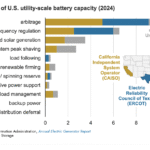Revolutionizing the Energy Industry: A New Era of Sustainability
The energy industry is on the cusp of a significant transformation, driven by the pressing need for sustainable practices and reduced carbon emissions. As the world shifts towards cleaner energy sources, companies are investing heavily in renewable technologies, with solar and wind power leading the charge. With global energy demand projected to increase by 30% by 2040, the industry must adapt to meet this growing need while minimizing its environmental footprint.
##
Driving Forces Behind the Energy Transition
The energy transition is being driven by several key factors, including government policies and regulations, declining technology costs, and increasing consumer demand for sustainable energy solutions. For instance, the cost of solar energy has fallen by over 70% in the last decade, making it more competitive with fossil fuels. This trend is expected to continue, with the International Energy Agency (IEA) predicting that solar energy will become the largest source of electricity globally by 2050.
###
Renewable Energy Technologies
Renewable energy technologies, such as solar, wind, and hydroelectric power, are playing a crucial role in the energy transition. These technologies offer a cleaner and more sustainable alternative to traditional fossil fuels, with the potential to significantly reduce greenhouse gas emissions. According to the National Renewable Energy Laboratory (NREL), widespread adoption of renewable energy could reduce CO2 emissions from the energy sector by as much as 80%.
##
Energy Storage: The Key to Unlocking a Sustainable Future
Energy storage is a critical component of the energy transition, enabling the efficient and reliable integration of renewable energy sources into the grid. Advances in battery technology have made energy storage more accessible and affordable, with the cost of lithium-ion batteries falling by over 80% in the last decade. This has led to a surge in demand for energy storage solutions, with the global market expected to reach $26 billion by 2025.
###
Smart Grids and Grid Modernization
The integration of renewable energy sources and energy storage solutions requires a modern and flexible grid infrastructure. Smart grids and grid modernization efforts are underway to enable the efficient and reliable transmission and distribution of electricity. These efforts include the deployment of advanced technologies, such as smart meters and grid management systems, which can optimize energy distribution and reduce energy waste. According to the Smart Grid Observer, the global smart grid market is expected to reach $145 billion by 2027, with the potential to reduce energy losses by up to 30%.

.png?w=1024&resize=1024,1024&ssl=1)
.png?w=150&resize=150,150&ssl=1)




